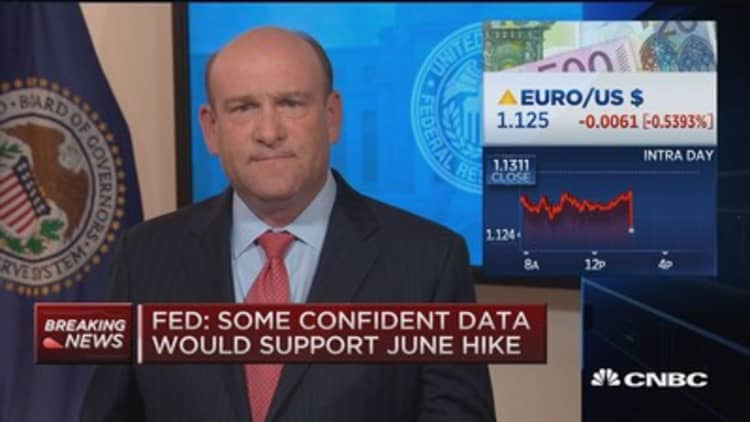



If the Federal Reserve wants to juice the growth rate of the U.S. economy and send stocks higher, it should raise interest rates and start a normal process of tightening instead of dragging it out, closely watched strategist Jim Paulsen said Wednesday.
The minutes from the central bank's April meeting, released Wednesday, show the Fed will likely raise interest rates in June if economic data points to stronger second-quarter growth as well as firming inflation and employment.
"This Fed has suspended Wall Street at the first tightening move and has perpetuated the fear that has lasted at least two years," the chief investment strategist at Wells Capital Management said in an interview with CNBC's "Power Lunch."
While the central bank started the process of ending its quantitative easing program in 2014, it did not make its first rate hike until December 2015, he pointed out.
Paulsen said, "Then they paused again and it's like stretching out or perpetually keeping us in this pattern of fear.
"If they get away from that and start a regular rise in rates I think Wall Street will calm down like it has in the past and the market will start trading more on fundamentals and do far better."
In this environment, Paulsen likes financial stocks not only because of an anticipated rate hike but because of their relative underperformance.
If deposit rates start to rise, the earnings story for banks improves remarkably, he said.
Economist Lindsey Piegza, on the other hand, isn't cheering the possibility of a June rate increase.
While there is a "desperation" among Fed officials to raise rates, the economic data do not support a hike, she told "Power Lunch."
"I don't see the justification for the Fed to continue to raise rates other than the fact that they've really backed themselves yet again into a corner by committing to a gradual increase in rates," said Piegza, chief economist at Stifel Fixed Income.
She's concerned about what's in store for fixed income investors.
"The Fed is going to continue to raise rates against backdrop of an economy that is still very fragile," she said.
Even if the short end of the yield curve follows the Fed rate increase, the long end will be restrained by the fact that the U.S. is "eking out 2 percent GDP."
"We're still seeing consumer spending very minimal, negative business investment. So that is going to create a much flatter curve, a much more difficult environment for investors."
Rick Rieder, BlackRock's chief investment officer of global fixed income, still thinks there is a low probability of a June rate hike, particularly because the meeting comes ahead of Britain's vote on whether to stay in the European Union. July, however, is on the table, he said.
"One of the things we are a core believer in is diversify your fixed income," he said in an interview with "Power Lunch."
With the U.S. being the first country to have rates rise, he also wants to own rate risk in Europe, Japan, Australia and Korea.
— Reuters contributed to this report.


